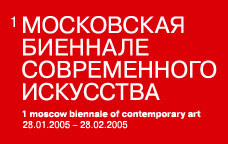1st Moscow Biennale 2005
28 Jan - 28 Feb 2005
28 January - 28February 2005
Why a new Biennale in Moscow?
The First Moscow Biennale of Contemporary Art, initiated by the Ministry of Culture of the Russian Federation, marks an important step forward in the process of reintegrating contemporary Russian art into the international art world.
One of the most obvious consequences of political and economical stabilisation in Russia is the growing interest of Russian society in contemporary culture, and more precisely contemporary art. In the last decade a totally new Russian art infrastructure has emerged through art fairs, galleries, non-profit exhibition spaces, festivals and conferences. For these reasons, 2005 is the right time for Moscow to create a major international art event, the first of its kind in the country.
The Moscow Biennale aims to become not only a great event in the artistic life of Moscow and Russia but also to play an important social, cultural and political role internationally. It is intended to be not only a particular powerful event, but a new institutional project that will strengthen relationships between curators, art historians, managers, federal authorities, sponsors and trustees, mass media and public opinion on contemporary art both in and outside Russia itself. It is the organisers' intention that The Moscow Biennale will become a reproducible strong structure that will find its place in the network of other major international art forums.
The Theme of the Biennale
Under the theme, Dialectics of Hope, the main exhibition will present art that focuses on one of the most fundamental experiences of a modern human being: hope. On the one hand, hope exists as a private existential feeling, touching particularly on issues of care or caring, on the other it is found in the older Utopian vision of a shared social feeling. The dialectical character of hope today as well as its emergence in different forms of contemporary art will be the focus for the exhibition, reflecting the influence that social and political changes exert on the way we attempt to anticipate our own future and the development of the societies to which we belong. In politically turbulent and worrying times, the function of hope as an organising principle of our lives becomes increasingly apparent.
Curators:
Joseph Backstein
Daniel Birnbaum
Iara Boubnova
Nicolas Bourriaud
Rosa Martinez
Hans Ulrich Obrist
Artists:
Boris Achour
Saadane Afif
Pilar Albarracin
Jennifer Allora & Guillermo Calzadilla
Pawel Althamer
Vasco Araujo
Micol Assael
Michael Beutler
Johanna Billing
Blue Noses
Blue Soup
John Bock
Jay Chung & Q Takeki Maeda
Santiago Cirugeda Parejo
Jeremy Deller
Trisha Donnelly
Sam Durant
Cao Fei
Yang Fudong
Carlos Garaicoa Manso
Gelatin
Subodh Gupta
Koo Jeong-A
Alexei Kallima
Irina Korina
Constantin Luser
Ivan Moudov
Aydan Murtezaoglu
Jun Nguyen-Hatsushiba
Melik Ohanian
Paulina Olowska
Diego Perrone
Michael S. Riedel
De Rijke / De Rooij
Tomas Saraceno
Tino Sehgal
Santiago Sierra
Rostan Tavasiev
David Ter-Oganyan
Fatimah Tuggar
Clemens von Wedemeyer
Venues
Former Lenin Museum, Moscow
Schusev State Museum of Architecture
Metro station Vorobyevy Gory (Sparrow Hills)

